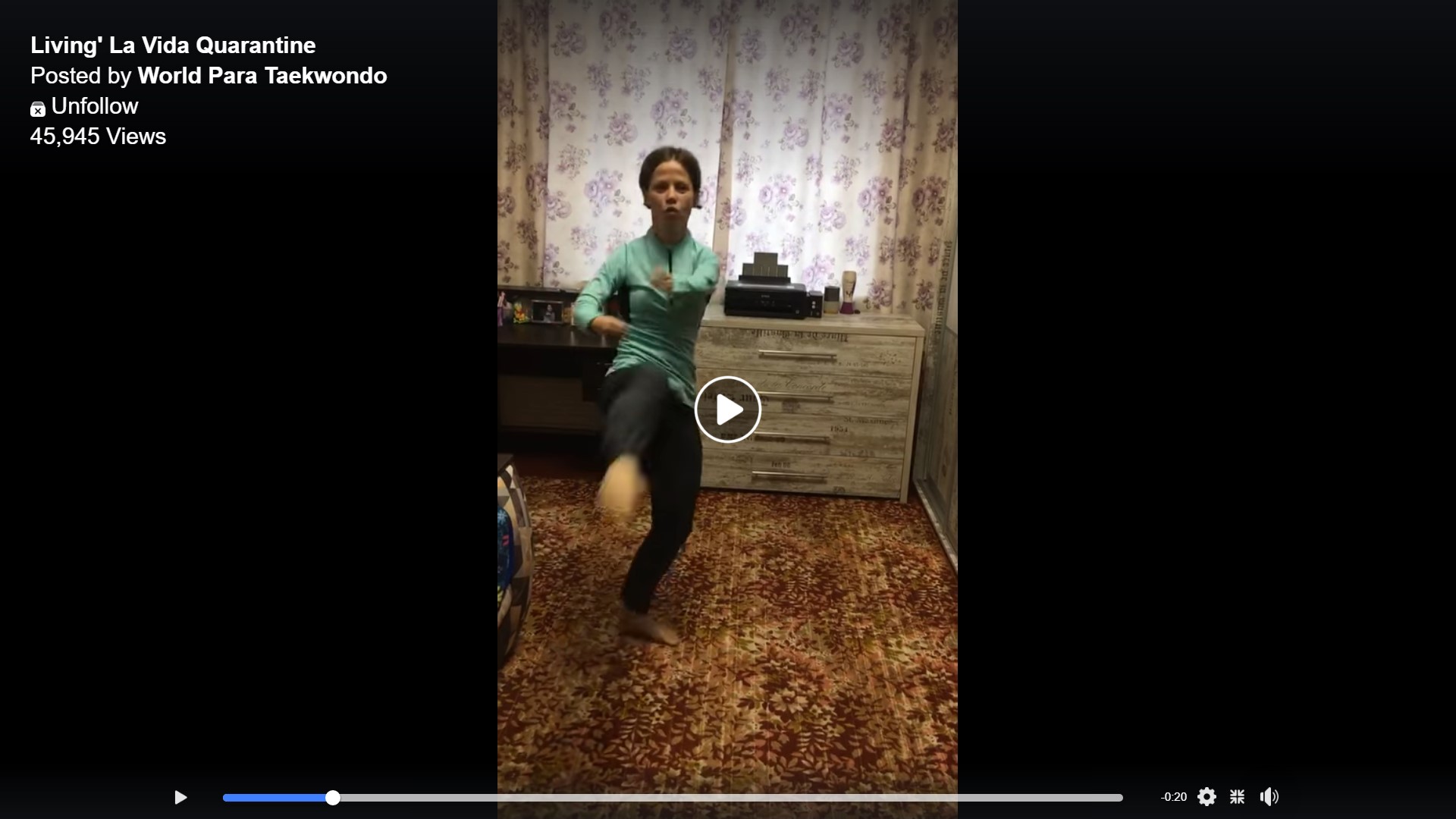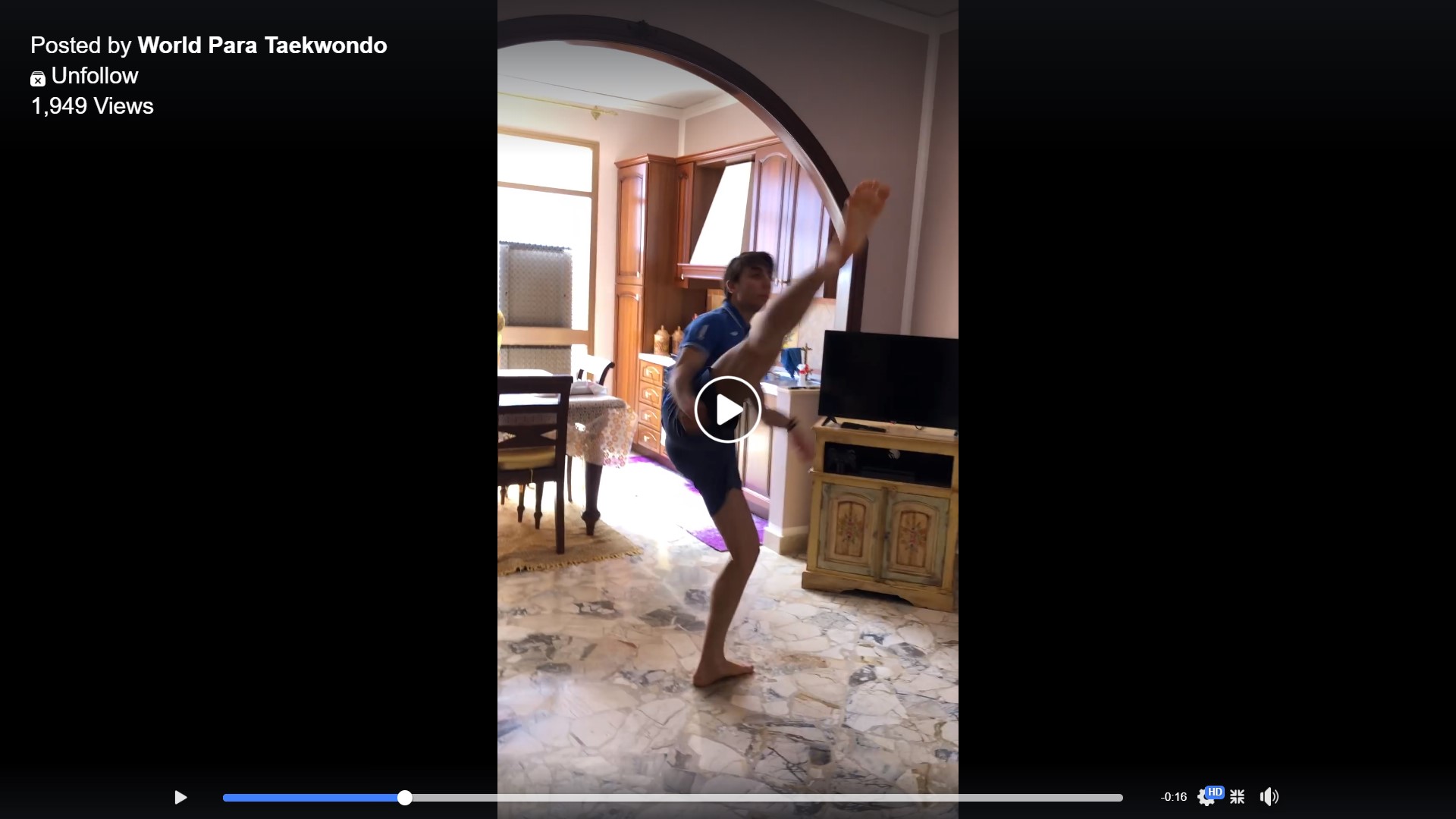Note: This article was prepared before the IOC made the decision to postpone the 2020 Olympic and Paralympic Games.”
World Taekwondo launches social media campaign to highlight how Para taekwondo athletes around the world are overcoming barriers to training by training at home.
-- Written by IPC Volunteer writer Lee Reaney
World Taekwondo’s #KickingItAtHome Initiative
The COVID-19 virus has effectively shut down the world of sports at a time when the world’s finest Olympic and Paralympic athletes are ramping up to be in peak physical condition. With governments around the world shuttering public spaces like gymnasiums, how are the Para taekwondo’s premiere Paralympic athletes coping?
Well, better than most.
“As Taekwondo can be practiced pretty much anywhere with minimal equipment, (there is) no special support (needed) for training”, says World Taekwondo’s Para Taekwondo Director Olof Hansson. To prove the point, “we started asking our athletes to share their training videos with us on social media”.
The response has been overwhelmingly positive.
 The first video of the #KickingItAtHome campaign, of Spanish European champion and former world champion Alejandro Vidal Alvarez training at home, has reached over 50,000 people in less than four days, making it the most popular Para taekwondo post of all-time.
The first video of the #KickingItAtHome campaign, of Spanish European champion and former world champion Alejandro Vidal Alvarez training at home, has reached over 50,000 people in less than four days, making it the most popular Para taekwondo post of all-time.
Athletes from nearly every continent have submitted videos to the campaign. World Taekwondo hopes to highlight every athlete that has already qualified for the Paralympic Games – and those that still have the opportunity to do so.
“It’s great”, says Hansson, “but keep the videos coming!”
Training at the “Epicentre of the virus”
Italy’s 2018 European champion Antonino Bossolo was one of the first to be featured in the campaign.
“It’s not easy, because I can’t go to the gym to train”, he says, “But I’m trying to do something at home to keep me in training (form).”
The World Health Organisation has labeled Italy the “epicentre of the pandemic”, meaning that Italian athletes like Bossolo are prevented from training at fitness clubs, gyms, or even from going for a run around the block.
“My area is stable, but we are still in the red zone and cannot leave the house except for basic necessities”, he explains. “The government has asked us to stay home to limit the (spread of the) infection.”
Not only affecting training routines
Fighters around the world have had to adjust, including the USA’s Evan Medell, the No. 1-ranked fighter in the men’s over 75 kg division.
“With gyms being closed down, I can’t weightlift like I normally do, so I’ve been using a body weight workout and resistance bands instead. The goal is still (to) keep improving as much as possible through the crisis”, says Medell.
The quarantine isn’t just taking a toll on the athletes’ training regimens.
“The bars and restaurants closing really affected me because I was a waiter, but now I’m laid off.”
Quarantine can be lonely
Quarantine can be even more difficult when you’re not at home. Morocco’s former No. 1-ranked Rajae Akermach is currently based in Germany, away from her friends and family.
“I’m under quarantine here (in Germany), so I can’t go to the gym”, says Akermash. “I stay in touch with my coach and do my exercises at home.”
Training takes her mind of the loneliness of living abroad – and the boredom.
“Everything is closed (and) we can’t go to work”, she says. “Now I’m far from my family, I live alone, and I’ve been at home for two weeks. I hope it passes quickly.”
Health is an issue
Training at home, without the assistance of a trainer or proper medical facilities, can be quite a challenge. Just ask Ukraine’s six-time world champion Vika Marchuk.
Vika needs work done on one of her knees before she can resume full training. With quarantine measures just being introduced in Ukraine, that could prove to be tricky.
“UKRCENTER (part of the Ukrainian Paralympic Committee) sent us to quarantine and that was the right decision”, says Marchuk. “With the leg, there is a bit of a problem. It will take time to heal and it is necessary for (medical assistance).”
Still, she manages to train at home and was able until recently to go to the stadium to run.
What’s next?
Para taekwondo is ahead of the curve when it comes to qualification. Currently 75% (54 of 72) of the athletes have already qualified, well ahead of the Olympic average of 57%.
Only two Paralympic qualification tournaments remain – Europe and Asia. An additional 12 athletes will earn qualification through these events.
“The aim is to have all Qualification Tournaments done by the entry deadline for (the) Tokyo 2020 Paralympic Games (on) August 3”, said Hansson.
IPC President Andrew Parsons recognises the challenges Para athletes face while under quarantine.
“We … sympathise with those Para athletes who are also unable to train as usual right now and are creatively looking for solutions at home”, said Parsons in a statement released last week.
Para taekwondo athletes can attest, and you can check out their creative training solutions on World Taekwondo’s Para taekwondo page at facebook.com/WorldParaTaekwondo.

